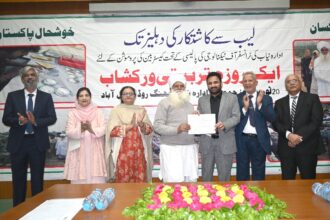In a landmark initiative set to transform the city’s daily commute, Karachi is deploying a state-of-the-art network of smart traffic signals across its major thoroughfares. This ambitious project, led by the city’s traffic engineering and management authorities, marks a significant leap from static, timed signals to an intelligent, adaptive system designed to dynamically manage the city’s complex and heavy traffic flow.
Read More: Corporate Philanthropy in Pakistan Ascends to PKR 25.44 Billion in 2024
The new smart traffic signals utilize a combination of advanced technologies, including real-time sensors, AI-powered cameras, and data analytics platforms. Unlike traditional systems that operate on fixed timers, this intelligent infrastructure continuously monitors vehicle density, queue lengths, and pedestrian movement at intersections. The system then automatically adjusts signal timings in real-time, prioritizing traffic flow on busier routes to reduce congestion, minimize travel times, and decrease overall commute frustration for millions of Karachiites.
This initiative directly addresses long-standing challenges such as traffic gridlocks, excessive fuel consumption, and vehicular emissions. By optimizing the flow of traffic, the smart signals are expected to significantly cut down on idle time at red lights, leading to lower carbon emissions and contributing to a greener urban environment. Furthermore, the enhanced data collection will provide invaluable insights for city planners for future infrastructure projects and long-term traffic management strategies.
A spokesperson for the Karachi Traffic Police highlighted the transformative potential of the project, stating, “This is not merely an upgrade of hardware; it is a fundamental shift in how we manage urban mobility in Pakistan’s largest city. These smart signals represent our commitment to leveraging technology to solve pressing civic issues. We are moving towards a system that is responsive, efficient, and data-driven, which will ultimately make our roads safer and less congested for everyone.”
The initial phase of the rollout is focusing on key corridors and high-traffic intersections identified as major bottlenecks. As the network expands and the AI algorithms learn from the vast amounts of collected data, the system’s efficiency is projected to improve continuously. The successful implementation of this project positions Karachi as a leading Pakistani metropolis in the adoption of smart city technologies, setting a new benchmark for urban development in the region.
Residents and commuters can expect to see a gradual improvement in traffic conditions as the system becomes fully operational and fine-tuned. The move towards smart traffic management is a critical component of the broader vision for a more connected, sustainable, and livable Karachi.






